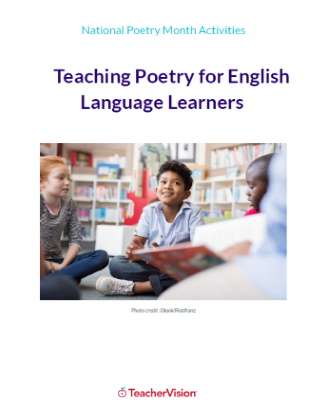This packet of strategies and tools for teaching poetry to ELLs will help ESL educators focus on building language arts skills through reading poetry. Developed by an experienced ESL educator, it includes 5 English language learning strategies for teaching students poetic forms, figurative language, sentence structure, and how to understand the meaning of the poem.
The foundation of this poetry unit is an included sample short poem; a list of additional appropriate elementary-level poems by Langston Hughes, Emily Dickinson, and others is also included. Featuring 2 graphic organizers that will help students apply close reading and critical thinking skills for language acquisition, this resource also includes 2 rubrics for assessing both beginner/intermediate and higher level students' work.
Use this resource with the whole class or small groups as a supplement for National Poetry Month, to build literacy skills, enhance new vocabulary, or help your ELLs learn to write their own poems.
Get your ELLs started using and writing poetry with these 5 tips from the packet:
Select Your Poems Carefully
When your
English language learners are at varying levels of language proficiency, it is important to pick a poem that is at the “Goldilocks” level: not too easy, not too hard, but just right.
Include Checks for Understanding
Read the poem aloud with students. After the first read-through, have lower-level students highlight words in the poem that they think are important. Then have them draw a picture or act out a visual interpretation of what they have read.
Break Poems Into Manageable Sections
With longer or more complex poems, it might not be realistic to expect each of your ELL students to interpret every single line.
Always Look for Differentiation Options
Plan your lesson with differentiation in mind. It is important to make sure that each of your ELL students can access the poem on some level.
Extend the Lesson
Extension activities can help cement and reinforce learning for ELLs. For example, have students write a new verse for the poem they just read.











